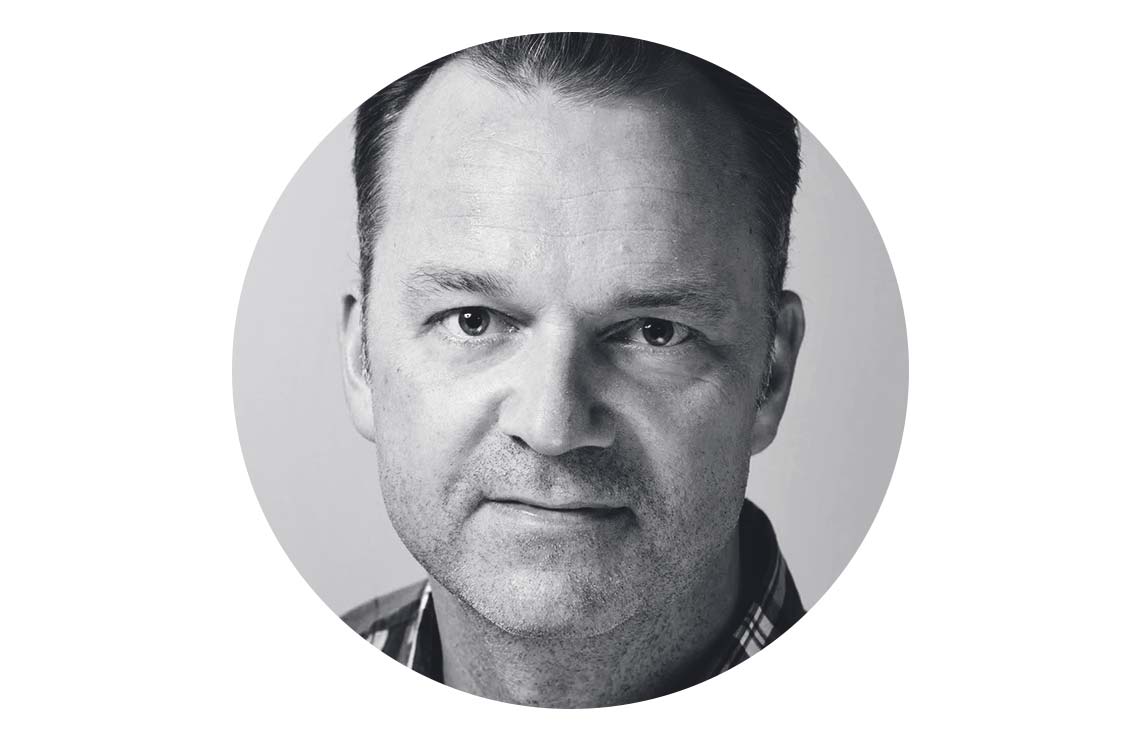AI for good or for bad?
How will AI impact our lives and society? Joacim Lund compares it to the breakthrough that came with the internet – and sees many similarities. AI will solve many problems in our daily lives. We just need to make sure it doesn’t create new ones.
By Joacim Lund

AI for good or for bad?
How will AI impact our lives and society? Joacim Lund compares it to the breakthrough that came with the internet – and sees many similarities. AI will solve many problems in our daily lives. We just need to make sure it doesn’t create new ones.
By Joacim Lund
Artificial intelligence is a flop. Ok, not really. But we are talking about it the wrong way.
In Norway, an opinion piece from 1996 pops up on a regular basis. The headline of the newspaper clipping is crystal clear: The Internet is a flop.
Every time it appears, people have a good laugh. But the person who wrote it (incidentally, a reader I keep getting meaningful emails from) wasn’t irrational in his argument. He believed that people who work on computers will get more than enough of it during office hours (this definitely applies to some of us), that humans are social beings and, moreover, that it would not be profitable for business to offer their services online.
“When we rent our videos, we will visit the rental store and make our selection in visual surroundings,” he opined.
27 years later, much of the debate around artificial intelligence is not entirely dissimilar. People are either for or against artificial intelligence. They think it’s either good or bad. They think it will eradicate us or not. They want to stop it or let it be.

As new technologies arrive – the sceptics speak up. New habits sometimes take time to accept.

As new technologies arrive – the sceptics speak up. New habits sometimes take time to accept.
At the same time, AI developers from around the globe are creating autonomous weapons, racist algorithms and extreme surveillance systems that challenge human rights. Other AI developers are creating systems that revolutionise medical research, streamline the public sector, or help keep the temperature of the planet below boiling point. And everything in between.
The possibilities seem to be endless. So, shouldn’t we rather be talking about how AI can be used responsibly?
It’s changed everything
Today, everyone knows that the internet was not a flop. The authorities communicate with us using the internet. Ukraine and Russia are bombing each other using it. The propaganda war is almost exclusively waged online.
But perhaps even more importantly: the internet solves problems and has made life easier for most people. I charge my car online, pay bills and rent my videos (but sometimes I do long to go back to discussing movies with the movie nerd who worked on Bislet Video instead of getting flimsy recommendations by an algorithm).
I listen to my music online, remotely activate the heaters at the cabin, where I can also stream my news broadcasts. People find life partners online and discover like-minded people who also get excited by photography, old Italian scooters, 16th-century clocks, or Talk Talk bootlegs. We have access to everything, everywhere, all the time.
That’s why everyone laughs at the “flop” prediction. He was absolutely certain and he was wrong. But that’s easy to see in hindsight. And it’s hard to predict.
In 1996, people were concerned about Charles and Diana’s divorce and Bill Clinton’s re-election. Who could have imagined that Diana would die in a car accident in Paris a year later? Or that two years later, Bill Clinton would be explaining why his sperm was on a dress?
Or that the internet was going to change everything?
Tomorrow is only a day away
I have no idea how artificial intelligence will have impacted society, people and the lives we all live in 2050. But I see several similarities between the internet in 1996 and artificial intelligence today:
Artificial intelligence solves problems and will make life easier for most people. Artificial intelligence is changing assumptions.
Also for people who don’t have good intentions.
“Whoever takes the lead in this field takes the lead of the world,” Putin said during a live address to 16,000 schools at the start of the school year in the fall of 2017. By “this field” he meant artificial intelligence. Xi Jinping had recently launched an ambitious plan to make China a world leader in artificial intelligence by 2030.
It almost makes you want to just ban the whole thing. Impose international sanctions and throw the baby out with the bathwater. The problem is that artificial intelligence opens up so many positive possibilities as well.
Things like evaluating X-rays, AI can solve much faster and better than humans.


Things like evaluating X-rays, AI can solve much faster and better than humans.
The toe is broken
I was once playing with my son. I chased him around the apartment, arms straight ahead, like a zombie. As I made my way around the kitchen table, my little toe hooked onto a chair leg. There was no doubt that the toe was broken. It pointed straight out to the side. Still, I spent most of the day in the emergency room.
The reason for this was a bottleneck in the system.
When people come in with minor fractures or just a suspicion that they’ve broken something, for that matter, an X-ray is taken. A doctor (the bottleneck) must study each individual image to see if there is a fracture or not. If there is no fracture, the doctor sends the patient home. If there is a fracture, the patient is placed somewhere on a priority list.
However, minor fractures are not life-threatening. If there is a lot to do in the emergency room, the X-rays will be given low priority until there is more time to look at them. When the doctor finally has time, he or she will study the picture and determine that there is no fracture – in about 70% of cases. The patient, who by then may have waited seven hours, is then told to go home, take two ibuprofen and three glasses of red wine (which my dentist once recommended), and turn on Netflix.
It’s things like this that artificial intelligence can solve much faster and better. And it’s already doing it, actually.
Level up
The other day I was visiting a hospital in Bærum, just outside Oslo. An enthusiastic, young, bearded radiologist pointed to an X-ray image on a screen in front of us. The picture showed a foot, and it looked quite similar to the picture taken once upon a time of my foot (except that the little toe didn’t point straight out to the side).
But one thing was different. The image had been assessed by an artificial intelligence.
Above the ankle bone, a yellow square had been drawn, lined with the text “FRACT.” That means there’s a fracture there. The software goes through all the X-rays as they come in. Seven out of ten patients are told immediately that they can go home. The rest automatically end up in a priority queue.
Doctors do not have to spend valuable time finding out that everything is okay, and patients do not have to wait. This is an extreme efficiency improvement in a health service that will experience greater and greater strain in the decades to come.
Should this have been banned? Some think so.
Sense and sensibility
A few months earlier, two Norwegian politicians warned that artificial intelligence leads to everything from polarisation to eating disorders, and perhaps even the extinction of humanity. The government should immediately “impose a public sector moratorium on adopting new commercial tools based on artificial intelligence,” they argued.
This is an absurd approach to artificial intelligence. The pressure on the healthcare system only increases as people age. To have any hope of maintaining good health services for the population, we must make use of the tools at our disposal. The AI tool at Bærum Hospital happens to be delivered already fully trained from abroad. All patient data is deleted, so as to avoid all privacy issues. Of course, there shouldn’t be a ban on such things. But the two politicians still had a good point:
“The development of AI has for a long time taken place without adequate regulation from the authorities.”
Now it’s happening
There has been a Wild West approach from the tech companies. Naturally. Development is rapid, and work on laws and regulations is slow. But the EU has been working diligently on the issue.
The EU’s first draft regulation of artificial intelligence, the so-called AI Act, was presented two years ago. It is likely to be formally approved within 2023. The EU is adopting a risk-based approach. For services that pose a low risk, it’s full speed ahead. Unacceptable risk means it’s prohibited. And for everything else in between, there are two more levels: acceptable risk and high risk.
The purpose of the AI Act is to ensure that artificial intelligence systems are safe and respect fundamental rights and values. This means, for example, that facial recognition in public spaces is banned. It’s not allowed to single out citizens for the authorities to keep an eye on in case they do something illegal. Stuff like that.
AI should be open and honest, not closed and manipulative. The resistance the AI Act has faced from tech companies suggests that regulation is needed. For example, Sam Altman, the man behind OpenAI and ChatGPT, has threatened to pull out of Europe if the regulations become too extensive.
Perhaps now it’s time to revisit the crystal ball.
A willingness to solve problems
In September 2023, Norway’s Prime Minister, Jonas Gahr Støre, held a press conference where he proudly announced that his government would allocate one billion Norwegian kroner to artificial intelligence research, to be used over the course of five years. On the same day, the government leaked that it would spend five billion on a new tunnel to shave a few minutes off the drive between two villages in the mountains of western Norway somewhere. But OK, a billion is money too.
A large and important part of the research will focus on how artificial intelligence can be used for innovation in industry and in the public sector. Like in hospitals, when people come in with sore fingers and toes. Or in building applications, so people don’t have to wait several months for the overworked caseworker to get far enough down the pile. Or to provide public services with a faster, larger and better basis for decision-making. Or to improve data security, in fact, and not worsen it.
And in so many other ways that I can’t possibly imagine.
That’s what politics is all about. To follow social developments and govern society in a way that makes it as good as possible for as many people as possible. Norway is just an obvious example because that’s where I live. The same goes for every other country and continent, and globally, for that matter.
As in other areas of society, international resolutions and treaties and sanctions must be adopted to ensure that artificial intelligence is used in a way that solves humanity’s problems, rather than create new ones.
That work is underway.
OK, here’s what the crystal ball says
If I’m going to allow myself to try to look 27 years into the future, to 2050, I’d guess that people are more concerned about themselves and their nearest and dearest, and not so much about what people were thinking back in 2023. But those who bother to read old newspapers might chuckle a bit at the banal discussions we had about artificial intelligence ’way back when.’ And the fact that many were either for or against. Maybe it’ll be the demand for a ban and the call to halt development that everyone will laugh at (try asking Putin to stop the development of artificial intelligence, by the way).
I’m guessing that my future grandchildren will experience an education system much more attuned to each student’s learning disabilities, learning styles and skills. That their health will be taken care of much better than by the GP they see every two years. That potential health problems will be discovered before they become major and serious. I’m guessing the car will be a safer driver than the human. That public transport will be much better adapted to people’s needs. That precise weather forecasts will control the heating in houses. That everyone will be better protected from abnormal activity, whether it’s in their bank accounts or in their apartments. Maybe I won’t have to think about shopping for food or cleaning the house anymore.
I’m guessing it will seem strange that society spent so much time and resources on having people perform repetitive and simple tasks. And that major and important decisions were made on a razor-thin knowledge base.
I am absolutely certain that artificial intelligence will be subject to international regulations. And that artificial intelligence will lead to global, regional, local and personal changes that are difficult to imagine today.
Because by then humanity will know better.
If, of course, it still exists.
[Sassy_Social_Share]

Joacim Lund
Technology commentator, Aftenposten
Years in Schibsted: 18
My favourite song the last decade: Bråtebrann – Kverletak